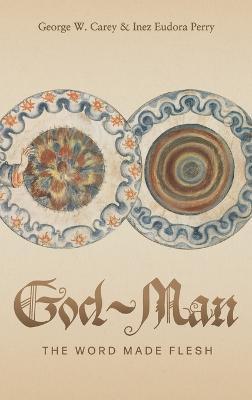God-Man: The Word Made Flesh

God-Man: The Word Made Flesh
George Washington Carey (1845-1924) and Inez Eudora Perry (1871-1961) were collaborators on topics of astrology, homeopathy, and biochemistry. Combining Christianity, ancient religions, physiology, anatomy, and more, Dr. Carey and Ms. Perry sought the answers to the nature of humanity and God.
One of the pair's lasting contributions was to the field of biochemistry. Influenced by Dr. Wilhelm Heinrich Schü ler who identified cell-salts-naturally occurring minerals that could supplement deficiencies in the human body-Dr. Carey went further, associating the signs of the zodiac to a natural deficiency in these minerals. Through careful supplementation, he believed that one could cure a host of physical and psychological ailments.
Astrologer Inez Eudora Perry was an adherent to Dr. Carey's ideas. The pair wrote several works together, including The Tree of Life and Relation of the Mineral Salts of the Body to the Signs of the Zodiac. In 1923, Dr. Carey made Ms. Perry a partner in his biochemical foundation, which was renamed The Carey-Perry School of The Chemistry of Life.
God-Man: The Word Made Flesh explores the allegory within scripture. Rather than taking each parable as literal truth, their interpretation draws on knowledge of the human body, astrology, world religions, and symbolism to find the real meaning behind the Biblical text.
In the story of Sara and Abram, for example, they explain that rather than a literal story in which a 90-year-old woman (Sara) and 100-year-old man (Abram) give birth to a son (Isaac), their real "child" is happiness-the meaning of the word Isaac in Hebrew. The true lesson is that "...age imposes no limit or barrier to the birth of the 'Incorruptible Seed' (Peter) for it is eternal life."
"Abraham, Isaac, Jacob, Noah, David, Solomon, Isaiah, etc., etc., are not historical characters," he writes. Nor are Pontius Pilate, Pharaoh, or Herod, which are names of offices or functions rather than individuals. Through exploring the meanings of these names, down to the letters that create them in the original Hebrew, the writers find new truth in the stories
PRP: 123.09 Lei
Acesta este Prețul Recomandat de Producător. Prețul de vânzare al produsului este afișat mai jos.
98.47Lei
98.47Lei
123.09 LeiLivrare in 2-4 saptamani
Descrierea produsului
George Washington Carey (1845-1924) and Inez Eudora Perry (1871-1961) were collaborators on topics of astrology, homeopathy, and biochemistry. Combining Christianity, ancient religions, physiology, anatomy, and more, Dr. Carey and Ms. Perry sought the answers to the nature of humanity and God.
One of the pair's lasting contributions was to the field of biochemistry. Influenced by Dr. Wilhelm Heinrich Schü ler who identified cell-salts-naturally occurring minerals that could supplement deficiencies in the human body-Dr. Carey went further, associating the signs of the zodiac to a natural deficiency in these minerals. Through careful supplementation, he believed that one could cure a host of physical and psychological ailments.
Astrologer Inez Eudora Perry was an adherent to Dr. Carey's ideas. The pair wrote several works together, including The Tree of Life and Relation of the Mineral Salts of the Body to the Signs of the Zodiac. In 1923, Dr. Carey made Ms. Perry a partner in his biochemical foundation, which was renamed The Carey-Perry School of The Chemistry of Life.
God-Man: The Word Made Flesh explores the allegory within scripture. Rather than taking each parable as literal truth, their interpretation draws on knowledge of the human body, astrology, world religions, and symbolism to find the real meaning behind the Biblical text.
In the story of Sara and Abram, for example, they explain that rather than a literal story in which a 90-year-old woman (Sara) and 100-year-old man (Abram) give birth to a son (Isaac), their real "child" is happiness-the meaning of the word Isaac in Hebrew. The true lesson is that "...age imposes no limit or barrier to the birth of the 'Incorruptible Seed' (Peter) for it is eternal life."
"Abraham, Isaac, Jacob, Noah, David, Solomon, Isaiah, etc., etc., are not historical characters," he writes. Nor are Pontius Pilate, Pharaoh, or Herod, which are names of offices or functions rather than individuals. Through exploring the meanings of these names, down to the letters that create them in the original Hebrew, the writers find new truth in the stories
Detaliile produsului









